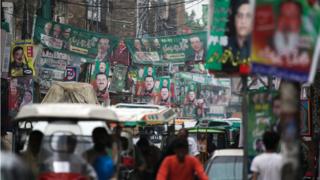 Image copyright
Reuters
Image copyright
Reuters
Pakistanis are preparing to vote after a campaign overshadowed by concerns of attempted manipulation and violence.
Nearly 106 million people are registered to vote for members of the lower house of parliament and four provincial assemblies.
The PTI party of former star cricketer Imran Khan is hoping to beat ex-leader Nawaz Sharif's PML-N.
But the Human Rights Commission says there have been "blatant" attempts to manipulate the polls.
Hundreds of thousands of troops will be deployed to secure the ballot, which opens at 08:00 (03:00 GMT). Votes will be cast for 272 National Assembly seats that are directly contestable.
Another 70, reserved for women and minorities, are distributed between parties that win at least 5% of the vote.
Voter turnout in the 2013 elections - won by the PML-N but without an outright majority - was 55%.
What's the context?
Pakistan has been ruled on and off by the military during its 71-year history. This election is significant because it will mark only the second time that one civilian government has handed power to another after serving a full term.
But the run-up to the vote has been controversial.
The Pakistan Muslim League-Nawaz (PML-N) complains of a targeted crackdown by the powerful security establishment, with the alleged help of the courts, in favour of Imran Khan and his Pakistan Tehreek-e-Insaf (PTI).
On Sunday, a judge in the High Court of Islamabad appeared to back up that allegation, saying that the powerful military Inter-Services Intelligence (ISI) organisation had been interfering in the judiciary.
Several PML-N candidates also say they have been coerced to switch to the PTI, and nearly 17,000 party members are facing criminal cases over breaking unspecified election rules. The Pakistani military denies interfering in politics.
Independent media, meanwhile, say there have been blatant attempts to muzzle them. There are also serious concerns about the participation of internationally designated militants in the election process.
For all these reasons, the human rights commission has said there are "ample grounds" to question the legitimacy of the polls, "with alarming implications for Pakistan's transition to an effective democracy".
Has Imran Khan's time come?
By M Ilyas Khan, BBC News, Islamabad
As the early voters queue up outside polling stations, the question on everyone's mind will be whether Mr Khan will be the next prime minister.
He entered politics in the late 1990s when memories of Pakistan's cricketers winning the World Cup were still fresh. But only in 2013 did his party emerge as a serious contender, with its leader touted as a harbinger of change out to fight corruption.
He lost by a wide margin, but has continued to lead what many see as a divisive campaign.
This election is the closest he's ever got to being prime minister. Will that happen? Or will the PML-N stay the largest party after a sympathy wave by voters for the man he helped oust?
Who are the main candidates?
The election is generally seen as a contest between the PML-N and the PTI.
Nawaz Sharif - a 68-year-old three-time PM - will watch these elections from a jail cell, after he was convicted by an anti-corruption court and sentenced in absentia to 10 years in prison. He was disqualified from office last year by the Supreme Court after the Panama Papers leak revealed his family's ownership of several luxury flats in London.
Mr Sharif returned from London earlier this month with his daughter, Maryam, and both were arrested. Their appeal hearings will not be held until after the vote.
Mr Sharif's brother, the former governor of Punjab province, Shehbaz Sharif, 66, is now leading the party.
But Imran Khan and his PTI have been rising in the polls. Mr Khan, 65, told the BBC last week that his opponents will "lose because of their track record" when in power,.
The country's best-known opposition politician, who is running on an anti-corruption ticket, has denied colluding with the military. Analysts say he will have to make serious inroads in Punjab province - a PML-N stronghold - in order to win the vote.
The PPP party of assassinated former Prime Minister Benazir Bhutto is widely expected to come third.
Now fronted by Ms Bhutto's son, Bilawal Bhutto Zardari, a 29-year-old Oxford University graduate, the party is promising to create a "peaceful, progressive, prosperous, democratic Pakistan".